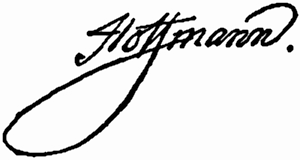Hoffmann’s years as an “Apprentice and Martyr”
From conductor to scene painter
After he had lost his occupation as a senior civil servant in Warsaw, Hoffmann had to experience a difficult professional and personal time during his second stay in Berlin.
“I haven’t eaten anything but bread for the last five days – it has never been like that before!” (May 7th, 1808, to Hippel)
The fully qualified lawyer with ambitions to be a composer applies for the job as a musical director at a theater.
Soon he gets an offer from Julius von Soden from Bamberg.
On September 1st, 1808 he moves into a flat at “Zinkenwörth 56” (today “Nonnenbrücke 10”) with his wife “Mischa”.
After a few performances under the conducting of the new capellmeister there’s a scandal. Hoffmann encounters adversaries; and with the audience having noticed that he is rather inexperienced in conducting, he is accused of conducting in the wrong way as he prefers to sit at the grand piano instead of holding the violin in his hands.
As a consequence, he isn’t allowed to conduct anymore, he is only allowed to wear the title capellmeister – but is paid less money. He is only working as a composer for the theater.
The artist can only survive by teaching singing lessons to young ladies. He has to move house to a cheaper flat: “Zinkenwörth 50” (today “Schillerplatz 26”, the museum you are in right now)
While Franz von Holbein is manager of the theater, Hoffmann becomes head of the machinery and decoration, scene painter and theatre composer, ticket clerk and consultant of the artistic director. He is even compelled to borrow money from the wine merchant, library owner and publisher Kunz.
Diary entry from November 26th, 1812:
“I had to sell my old coat, just to get some food.”
After he had been “totally removed from the theater” (letter from 1809), Hoffmann has a very productive time, working again as:
Composer: for example the opera Aurora and the Miserere for choir and orchestra and chamber music
Caricaturist: drawings of friends and well-known characters
Writer of critical essays on music and literature, author of narratives that later become part of the “Fantasiestücke in Callot’s Manier” (Fantastic pieces in Callot’s Manner) (1814/15): Don Juan, Nachricht von den neuesten Schicksalen des Hundes Berganza (Message from the latest fates of the dog Berganza), Kreisleriana
